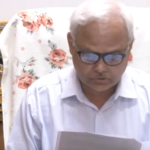Narration Jashore Board
“Have you learnt your lessons?” father said to Arman. “No, I’ve forgotten,” said he. “That’s very bad. You must be more careful about your preparation for the examination. By doing so, you can make a good result,” said his father. “Thank you very much for your timely advice.”
Narration Jashore Board
Answer: Father asked Arman if he (A) had learnt his (A) lessons. Arman replied negative that he (A) had forgotten. Father told him that that was very bad. He (F) added that he (A) had to be more careful about his (A) preparation for the examination and by doing so, he (A) could make a good result. Arman thanked him (F) very much for his (F) timely advice.
Narration Dinajpur Board 2019 ques and answer
Direct to Indirect Speech:
Question:
He said, “I will come to the party tomorrow.”
Answer:
He said that he would come to the party the next day.
Explanation:
In the above sentence, the direct speech is converted into indirect speech by following the rules of narration change.
- Change of reporting verb:
In direct speech, the reporting verb “said” remains the same. However, when converting to indirect speech, we add “that” to introduce the reported speech. - Tense change:
The tense of the reporting verb changes from present (will) to past (would) when shifting from direct to indirect speech. - Change in time expressions:
The word “tomorrow” is changed to “the next day” to fit the new reporting context in indirect speech. - Pronoun change:
There is no pronoun change needed in this case since the sentence does not contain any pronouns referring to the speaker or listener.










